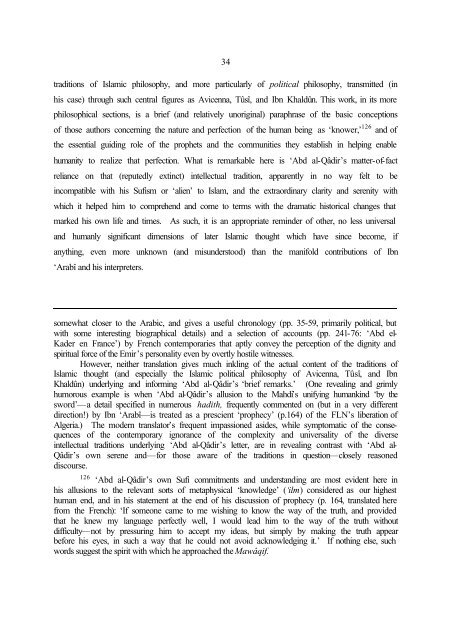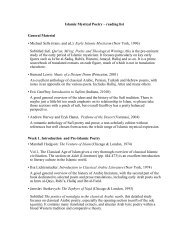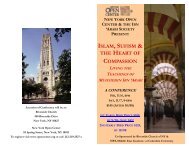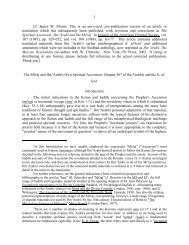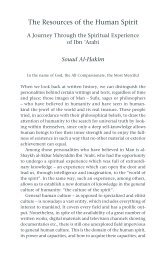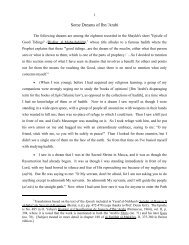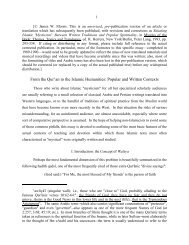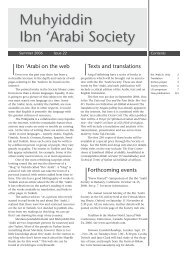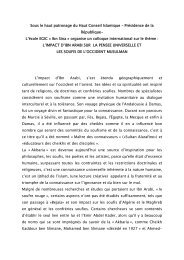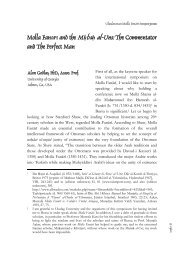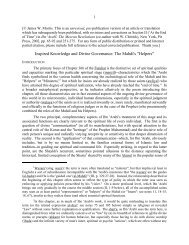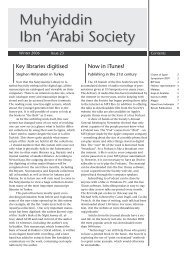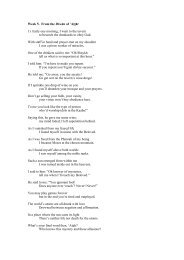Part III (pdf) - Muhyiddin Ibn Arabi Society
Part III (pdf) - Muhyiddin Ibn Arabi Society
Part III (pdf) - Muhyiddin Ibn Arabi Society
Create successful ePaper yourself
Turn your PDF publications into a flip-book with our unique Google optimized e-Paper software.
34traditions of Islamic philosophy, and more particularly of political philosophy, transmitted (inhis case) through such central figures as Avicenna, Tûsî, and <strong>Ibn</strong> Khaldûn. This work, in its morephilosophical sections, is a brief (and relatively unoriginal) paraphrase of the basic conceptionsof those authors concerning the nature and perfection of the human being as ‘knower,’ 126 and ofthe essential guiding role of the prophets and the communities they establish in helping enablehumanity to realize that perfection. What is remarkable here is ‘Abd al-Qâdir’s matter-of-factreliance on that (reputedly extinct) intellectual tradition, apparently in no way felt to beincompatible with his Sufism or ‘alien’ to Islam, and the extraordinary clarity and serenity withwhich it helped him to comprehend and come to terms with the dramatic historical changes thatmarked his own life and times. As such, it is an appropriate reminder of other, no less universaland humanly significant dimensions of later Islamic thought which have since become, ifanything, even more unknown (and misunderstood) than the manifold contributions of <strong>Ibn</strong>‘Arabî and his interpreters.somewhat closer to the <strong>Arabi</strong>c, and gives a useful chronology (pp. 35-59, primarily political, butwith some interesting biographical details) and a selection of accounts (pp. 241-76: ‘Abd el-Kader en France’) by French contemporaries that aptly convey the perception of the dignity andspiritual force of the Emir’s personality even by overtly hostile witnesses.However, neither translation gives much inkling of the actual content of the traditions ofIslamic thought (and especially the Islamic political philosophy of Avicenna, Tûsî, and <strong>Ibn</strong>Khaldûn) underlying and informing ‘Abd al-Qâdir’s ‘brief remarks.’ (One revealing and grimlyhumorous example is when ‘Abd al-Qâdir’s allusion to the Mahdi’s unifying humankind ‘by thesword’—a detail specified in numerous hadith, frequently commented on (but in a very differentdirection!) by <strong>Ibn</strong> ‘Arabî—is treated as a prescient ‘prophecy’ (p.164) of the FLN’s liberation ofAlgeria.) The modern translator’s frequent impassioned asides, while symptomatic of the consequencesof the contemporary ignorance of the complexity and universality of the diverseintellectual traditions underlying ‘Abd al-Qâdir’s letter, are in revealing contrast with ‘Abd al-Qâdir’s own serene and—for those aware of the traditions in question—closely reasoneddiscourse.126‘Abd al-Qâdir’s own Sufi commitments and understanding are most evident here inhis allusions to the relevant sorts of metaphysical ‘knowledge’ (‘ilm) considered as our highesthuman end, and in his statement at the end of his discussion of prophecy (p. 164, translated herefrom the French): ‘If someone came to me wishing to know the way of the truth, and providedthat he knew my language perfectly well, I would lead him to the way of the truth withoutdifficulty—not by pressuring him to accept my ideas, but simply by making the truth appearbefore his eyes, in such a way that he could not avoid acknowledging it.’ If nothing else, suchwords suggest the spirit with which he approached the Mawâqif.


